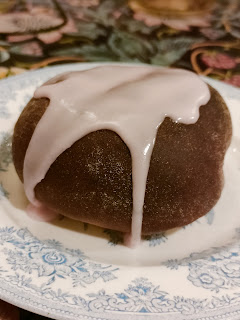I didn't mean to leave it so long between posts, but with everything that's going on at the moment, home and abroad, I haven't managed to do much sensible reading. I've dipped in and out of a handful of books I haven't really liked or got much to say about. Most of them have been Tik Tok favourites and are primarily aimed at a younger audience who also enjoy fantasy more than I do.
It's been useful for me to read bits of them from a work perspective - they're hugely popular with a significant part of our customer base, and I can see why. I've not really had any interest in reading anything more demanding either, and they've stopped me doom scrolling for which I'm grateful. A better use of my time was spending part of my weekend off with mum and her dog though. Some decent walks, and a lot of snuggling on the sofa, and eventually (after the dog had scared off what we think might have been a would-be burglar from getting in the garden in the early hours) on my bed - but she'd earned duvet and a blast of electric blanket privileges by then, and I was glad of the company.
This evening though I've finally had a go at a recipe I've been contemplating for a week or more. I've been following the Cook for Ukraine hashtag (the just giving page is here #CookForUkraine all proceeds are going to Unicef). When I was looking through Olia Hercules 'Summer Cooking' for rhubarb inspiration the only reference I found was for some filled buns in the Summer Kitchen Memories. I had a bit of a google for something like a recipe without much luck so I've started making one up and this is my first attempt.
The Summer Kitchen Recipes section is one of the things that make 'Summer Kitchens' such a special book, and these accounts have even more resonance now. It's Sofia Vozniuk's memory that bought up rhubarb. She spent her childhood in the Volyn region near the Polish border and she talks about sweet yeasted buns filled with rhubarb, the tops brushed with beaten egg applied by cockerel feathers.
As Easter more or less coincides with the beginning of garden rhubarb (rather than forced rhubarb) I've taken a paska (traditional Slavic Easter bread) and adapted it a bit. For the dough, gently warm 150ml whole milk with 50g of unsalted butter until the butter has melted. Leave a pinch of saffron strands to steep in 1 tablespoon of boiling water. Mix 350g of white bread flour, a teaspoon of ground cardamom 1/2 teaspoon of fine salt, 85g of granulated sugar, 2 sachets of instant yeast, a beaten egg, 1/2 a teaspoon of vanilla extract, and 1/2 a teaspoon of almond extract, add the milk and butter mix. Knead with a dough hook for 5 - 10 minutes then cover in a bowl and let double in size (should take about an hour).
Knock back the dough and let it rise again for half an hour. Chop up about 100g of tender new rhubarb into cm long chunks, mix it up with a generous spoonful of sugar. I also added some vanilla paste, but I'm not sure it was necessary. Divide the dough into 8 more or less equal lumps, flatten each one slightly and put a scant dessert spoon of rhubarb in the middle. Fold the dough around it until it's a nice bun shape, and place on a baking sheet. Cook in a hot oven (around 180C fan for about 15 mins, or until they sound hollow. If they're colouring too much cover with baking paper.
I iced the first bun with an almond and rhubarb glaze - didn't much like it, so won't be bothering to do that again. I will be donating to #CookForUkraine though, and having another go at getting this recipe just so. It's good at the moment but not perfect so do feel free to tinker.

No comments:
Post a Comment